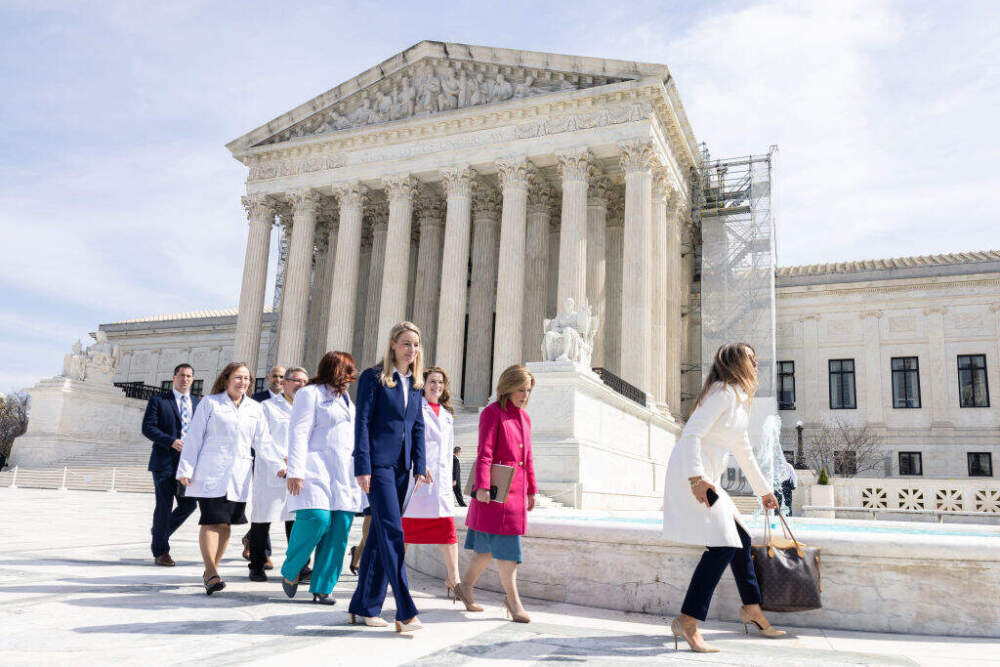Advertisement
Commentary
The Supreme Court must follow the science on mifepristone

This week, the U.S. Supreme Court heard arguments in a case that concerns the regulation of mifepristone, one of two drugs used in the most effective medication abortion regimen, as well as other pregnancy-related health care, including miscarriage management and labor induction.
This challenge to the Federal Drug Administration’s (FDA) approval of mifepristone, which comes from anti-abortion doctors and organizations representing anti-abortion doctors, isn't about health and safety. After all, mifepristone has had FDA approval for more than two decades with a 99% safety rating and a 95% efficacy rating. The plaintiffs in this case are trying to impose restrictions on mifepristone that contradict decades of medicine and research. This case, FDA v. Alliance for Hippocratic Medicine, is an attempt to limit access to a method of care that has become more popular in recent years, especially after the Dobbs decision.
Since the FDA updated its guidance for mifepristone in 2016 and again in 2021, allowing it to be prescribed without in-person pick-up, medication abortion has become much more common. A new report from the Guttmacher Institute shows that nearly two-thirds of all abortions performed in the U.S. in 2023 were medication abortions. This is, in part, due to increased access to telehealth over the past few years. At Planned Parenthood League of Massachusetts (PPLM), we're witnessing a significant trend: over half of our abortion patients now opt for medication abortion. Since launching our telehealth program in 2021, the provision of this care has steadily risen.

This is crucial because telemedicine abortion significantly lightens the burden on patients. It empowers them to safely handle their abortion in the privacy and comfort of their homes, sparing them from the logistical hassles and financial strains of childcare and time away from work or school as well as travel to distant abortion providers, which could be dozens or even hundreds of miles away. And mifepristone has proven to be equally safe and effective whether prescribed in-person or remotely.
The accessibility of mifepristone, coupled with the proactive actions of our state leaders to safeguard and enhance its availability in Massachusetts, has been instrumental in driving progress toward reproductive health equity. Just weeks after the Dobbs decision, the state took decisive action by allocating millions of dollars in funding for abortion access. This investment facilitated the implementation of new programs aimed at expanding medication abortion services, such as those at Health Imperatives, which created abortion access on Cape Cod for the first time in over a decade. Funds were allocated for training new abortion providers, a crucial initiative undertaken by organizations like PPLM. And the Massachusetts Legislature passed a comprehensive reproductive health care law that included a mandate for public colleges and universities to make medication abortion accessible to students, either at campus health centers or through a referral partnership with a provider.
Gov. Healey further bolstered reproductive health rights by issuing an order to safeguard mifepristone within the state's abortion shield law. This proactive measure ensured that providers like PPLM could secure a lasting supply of the medication, irrespective of federal judicial rulings. By facilitating bulk orders of mifepristone, providers can maintain uninterrupted access to the most effective and evidence-based care for patients, safeguarding reproductive autonomy in the face of legal uncertainties.
The case before the Supreme Court poses a significant threat to the progress we’ve made in Massachusetts to provide more equitable access to abortion. If the court allows the Fifth Circuit Court of Appeals' decision to stand, reinstating medically unnecessary restrictions such as requiring an in-person visit to a doctor to obtain mifepristone, the burden on providers could increase dramatically. Patients could endure longer wait times, delays in care and higher costs. And these burdens will disproportionately impact communities of color and people with lower incomes, exacerbating health inequities.
Restrictions on mifepristone would not only limit a person’s options for abortion care but would also hinder doctors’ ability to provide the most effective treatment for patients experiencing a miscarriage or pregnancy-related emergencies, which could be life-threatening.
This case has far-reaching implications beyond just access to mifepristone. Not only does it risk undermining states' authority to safeguard abortion rights, but it also sets a dangerous precedent that could have a chilling effect on U.S. drug development and jeopardize the regulation of all medications. By challenging the FDA's authority over the approval process for medications, this case opens the door to potential disruptions in patients' access to other FDA-approved medications that have already been proven safe and effective.
If this case successfully challenges the authority of the FDA, other medications could become targets of conspiracy theories and misinformation campaigns, which could influence public perception, undermine confidence in medication and create barriers to access for people who legitimately need these drugs.
It's imperative to acknowledge the extensive ramifications of this case, as it could profoundly impact access to health care that people of all genders rely on to support their health, their families and their futures. The Court should follow the science and reject this politically motivated effort to restrict access to a safe and essential medication.
